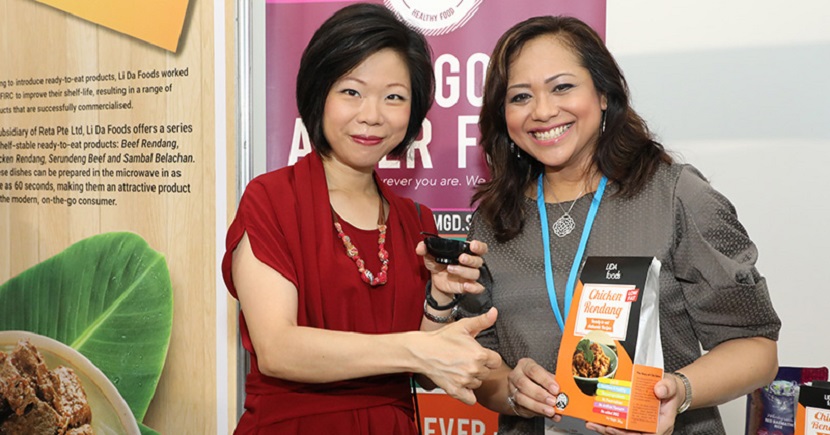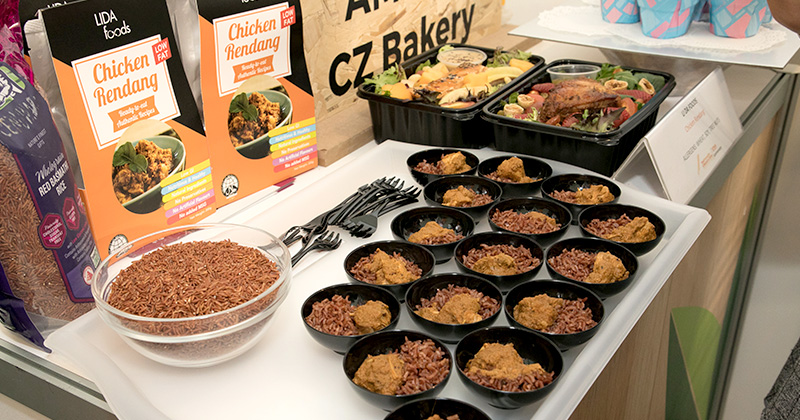
In less than two years, Li Da Foods' co-founder Rita Zahara Mohd Nazeer has turned her family’s rendang recipe into a pre-packed microwave meal with a shelf life of up to a year.
This recipe update was made possible through co-innovation with the Food Innovation and Resource Centre (FIRC).
Launched in 2007 as a joint initiative between Singapore Polytechnic and SPRING Singapore (now Enterprise Singapore), FIRC provides food businesses with technical know-how in new product and process development.
Rita Zahara and Evelyn Ong, manager of product innovation at FIRC, share how Li Da Foods found its ready-to-eat rendang success.
How did the idea for Li Da Foods’ rendang ready meal come about?
Rita: I was originally from the media industry but my grandparents and mum were in the food business. After they passed away, I wrote two cookbooks in memory of them. I wanted to commercialise the recipes and bring it to people’s door steps without opening a brick-and-mortar store. But cooking chicken rendang takes four hours, which was why I wanted to innovate by leveraging technology to make it easy for others to enjoy my family’s recipe.

Was the partnership between Li Da Foods and FIRC crucial for the idea to materialise?
Rita: After speaking to Workforce Singapore and Enterprise Singapore, I was linked up with FIRC. I found that they are really into innovation and that tickled my fancy. I only had to cook the chicken rendang once and sent it to a laboratory where the experts did most of the work. After a year, the rendang ready meal was born.
Were you apprehensive about sharing your family’s recipes?
Rita: I wouldn’t be writing two cookbooks and sharing my family’s recipe if I were apprehensive and afraid. I think it has to do with my upbringing. I wasn’t afraid to share with FIRC either. I found that it opened doors to meet new people and encouraged me to innovate a little bit more because when the risk is shared, you can feel more assured.
Could you have done it without FIRC?
Rita: No, absolutely not. We have to hunt in a pack! We get to where we are today not just by hard work, but by the support that comes from behind the scenes. To disrupt the food and beverage sector, there is a need to work with people who are well-versed in technology, not just in the use of machines but also in food innovation.
Has it set in motion something bigger for Li Da Foods?
Rita: The chicken rendang project kick-started my mission to bring my food products to all parts of the world. This has led me to create other products aimed at the international market, such as AMGD. (It stands for Ahhmahgawd, an online food delivery service that has developed over 200 healthy recipes and delivers in Singapore and Hong Kong.)
How do you make sure the original flavour is not lost?
Rita: I champion Malay heritage culture and authentic recipes so we try to keep our products as original and personal as possible. But you need technology to commercialise and make it accessible to everyone. Only by extending the shelf life to over a year can that happen.
There is that misconception that when you inject food with technology and innovation, it’s not going to be as original as you’ll like it to be. But we are a walking example of how you do so without losing originality and authenticity.
How does FIRC help food manufacturing businesses like Li Da Foods?
Evelyn: Food manufacturers usually come to us with a problem statement or a vision, such as wanting to extend the shelf life of their food so that they can sell it in the retail market or to export it overseas. They will be introduced to the business development team which will link them up with food technologists who have the relevant expertise. These food technologist swill work hand-in-hand with them to, for instance, come up with a practical way to extend their product’s shelf life without compromising on its quality and safety.
In addition, FIRC offers sensory evaluations and consumer insights to help businesses assess whether their products are suitable for a particular market. For example, if a business wants to target the Japanese market, FIRC is able to help it conduct a blind taste test with a pool of Japanese participants. This will help the company collect data for its product development.
Listen to the full podcast on MONEY FM 89.3 here.
Looking to connect with potential partners to co-innovate? We have the resources to support you!
Read all stories here.

